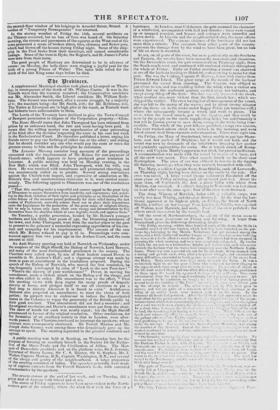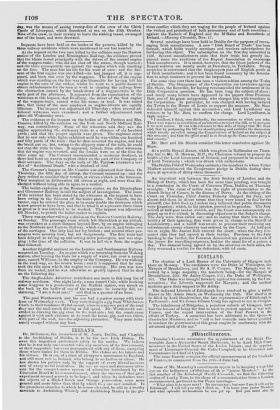The severe storms at the end of last week, and
on Tuesday, did a great deal of dainage both inland and at Sc:,,
I he storm of Frilay appears to have been most violent in the North- eastern part of the coatory, where the wind blew with the force of a hurricane. At Leiden, near Colchester, the gale assumed the character of a whirlwind, accompanied with hail and thunder : trees were rooted up or snapped asunder, and houses and cottages were unroofed and blown down. At Lincoln and the neighbourhoed also, the same effects were experienced. The extreme violence of the hurricane did not last more than a minute. The accounts from other parts of the country represent the damage done by the wind to have heeu great, but no lose of life on shore is recorded.
At sea, on all parts of the coast, but more particularly on the Southern
and Eastern, the wrecks have been unusually numerous and disastrous. On the Devonshire coast, the gale commenced on Thursday night, from the South-south-west, and continued with unabated violence throughout the whole of Friday. Early on Friday morning, a vessel was observed at sea off the harbour leading to Iiidefiwd, at; uleavem lug to make for that port. She was the Collina, Captain P. Harvey, laden with timber from Prince Edward Island. The great surge at the mouth of the harbour prevented the vessel from entering. The Captain was obliged to put about to sea, and was scudding before the wind, when a violent sea struck her on the starboard quarter, carried away her bulwarks, and swept every thing off the deck. She had seacoely recovered the shock, when another sea, inure violent titan the first, struck her ; which un- shipped the rudder. The crew having lost all management of the vessel, site was left to the mercy of the waves; and in about twenty minutes after she drove on to the rocks under Baggy Point, (an immense cliff,) where she subsequently became a wreck and went to pieces. The crew, when the vessel struck, got on the rigging, and they could be seen by the people on the sands supplieating help ; but unfortunately it was not in human power to save them, owing to the rocks being inac- cessible. The whole of the poor fellows perished, except two seamen, who were washed ashore about ten o'clock in the morning, and were found almost dead from exposure and exhaustion. There were eight lost.
On Friday, the Mary of Sunderland, being unable to put into Shore- ham, cast her anchor off Brighton ; hot it would not hold, and the vessel was seen by thousands of the inhabitants dragging her anchor and gradually approaching the rocks. She at length struck off Kemp- town ; and Captain Manby's apparatus was tried, but proved ineffectual. A communication was made with the vessel by means of a buoy, and all the crew were saved. Two other vessels struck on the shore near Rottingdean. The crew of one was obliged to remain in the rigging till Saturday morning; when they were rescued, benumbed with cold.
The Mary, a collier, Captain Scott, from Shields, sunk off Lowestoffe, on Thursday night, having been driven on the sands by the gale. Her crew was saved. A large vessel (name unknown) foundered off the same place on Friday morning, and all on board peri-hed. About the same time, off SAnthwold, the Ant, a sloop laden with wheat front Maldon, was wrecked. A collier belonging to Newcastle was lost about an hour after near the same spot : four of the crew were drowned.
The sloop Wigeon of Berwick, laden with a valuable cargo, was totally lost near Whitby, and the crew drowned. At the time the hur- ricane appeared at its highest pitch, on Friday, the Susan of North im Shields, a collier, on her voyage front Loud to S■delds, was capsized off Walton, near Harwich, and sunk. Four of the crew perished ; the others saved themselves by the vessel's boat.
Off the coast of Northmoberland, the elf,•ets of the storm seem to have been most disastrous on Friday and Saturday. A letter from Sunderland gives the following distressing details- " On Friday morning, within three hundred yards of the shore, the Syria (a beautiful vessel of 210 tons burden, whirl, had only been launched on the pre- vious day, helouging to the Messrs. Nicholson) had got jammed amoffg the rocks, and a little further off another barque of similat dimensi.,us was buffeting the waves in a feeble effort to reach the pier. The cre:ss had been occupied in pumping the whole morning, and wese now co;npletely exlmn,ted. By twelve o'clock the sea rose to a tremendous height, and .kslnat with Such vehemence towards the harbour that the waves heat completely over the Northern Light- house. There NV ■ now a general cry out for the life-boat: it was manned with a daring and gallant crew, who, after a desperate struggle, and encountering many difficulties, succeeded in landing nine men (the whole of the crew) from the Helen. Many attempts were then made to reach the Syria. It was a melancholy sight to see the pour fellows who composed lice erew elibging to the ropes as each wave swept over them in its fury. An 0.2easional shout, as the life-boat neared them, and was often driven away by the surge, proclaimed to those upon the beach the agonized feelings of the sufferers. One, more adventurous than the rest, leaped overboard, but WAS never seen to rise. All now seemed to be confusion on board ; for the life-bits having proved by several trials the inutility of Mr. Carte',- •ha n.n now almost gave up the attempt in despair. The other " this time gone to pieces; and various 'tarts of n schooner. ' i la.en discerned in the offing at an earlier hour, were washed with i. to the shore. In the schooner all hands had perished. After the 1' -!. i- .11 Ipp:Irently made its final effort for the preservation of the Syria. .; ' • it' Of the moan- tamous waves which were momentarily over:, .
not a soul was to be seen aboard, the
In a short time, Imwevcr, the lif,:-boat to land, the remaining four hae!ng met a Leach now voluntm it Mime ! t. :am
the gallant officers at.
trial, proffering to be; I, r T make the attempt. ..e master of the Svriri. the number of the drowned. One of the men washed overboard by a wave and lost, utmost to save him.
" On Saturday morning the slime wa- account has readied of the I tendon : an•I :t the Durham Packet is 1,st, astir all
Newcastle are most av ‘11:: at T‘: exceeds ours. '1'h, h.,
and the ve,,A hi a
water in the riv,11.t.,,t ; veered to the North-cat: and 1-1 thick moist hangs over it.- . _`:..:}t-west. est. ti as se-
The gale of 'Cues tat 1,I,•I
verily felt at Livvrpool. Lic 1, . rau ,a1 the
North Bank, a,t,i • a n A . and it
is feared the k`;',• . " ' s .i.tmages to shipping arc s 1,--: ;a • 'o; list ;It 12.,■- 1,;7• !.. •;reeeding com- prise those ■•!'
vl 'alien she righted all liv,n washed off. ihrve of the Crew
.,1 .,f thase ea the
.t rest, one of • • • upon another !..surd useless to among
t wa.s
their No
• ,ty that and fe far fmnd, to pieces. The The wind has 1;1, aLb a licavY "'ell, and a day, was the means of saving twenty-five of the crew of the Chirk Castle of Liverpool, which foundered at sea on the 20th October. Wine of the crew, in their anxiety to leave the sinking vessel, swamped sae of the boats, and were drowned.



























 Previous page
Previous page